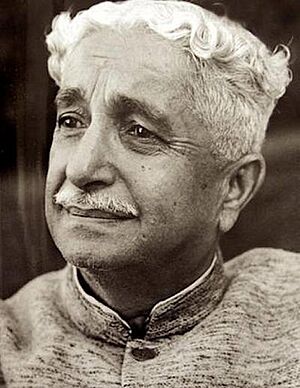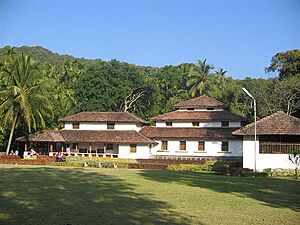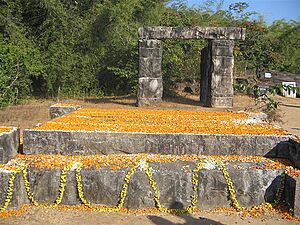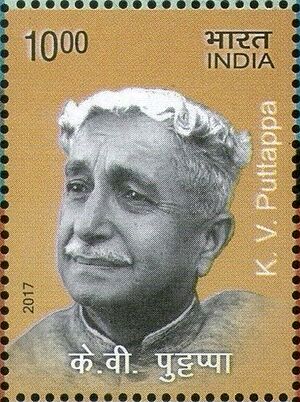Kuvempu facts for kids
Quick facts for kids
Kuvempu
|
|
|---|---|

Kuvempu in the 1940s
|
|
| Born | Kuppalli Venkatappa Puttappa 29 December 1904 Hirekodige, Koppa, Chikmagalur, Kingdom of Mysore (now in Karnataka) |
| Died | 11 November 1994 (aged 89) Mysore, Karnataka, India |
| Pen name | Kuvempu |
| Occupation | Poet, novelist, playwright, academic |
| Language | Kannada |
| Genre | Fiction, drama |
| Literary movement | Navodaya |
| Notable awards | Karnataka Ratna (1992) Padma Vibhushan (1988) Jnanapith Award (1967) Padma Bhushan (1958) Sahitya Akademi Award (1955) |
| Spouse |
Hemavathi
(m. 1937–1994) |
| Children | 4, including Poornachandra Tejaswi |
Kuppalli Venkatappa Puttappa (born December 29, 1904 – died November 11, 1994) was a famous Indian writer. He is better known by his pen name Kuvempu. He was a poet, playwright, novelist, and critic. Many people consider him the greatest Kannada poet of the 20th century. He was also the first Kannada writer to win the prestigious Jnanpith Award.
Kuvempu studied at Mysuru University in the 1920s. He later taught there for almost 30 years. From 1956 to 1960, he served as the university's vice-chancellor. He helped start education in Kannada as the main language. The Government of Karnataka honored him with the title Rashtrakavi ("National Poet") in 1964. He also received the Karnataka Ratna ("The Gem of Karnataka") in 1992. The Government of India gave him the Padma Vibhushan in 1988. Kuvempu also wrote the Karnataka State Anthem, Jaya Bharata Jananiya Tanujate.
Contents
Kuvempu's Life Story
Early Years and Schooling
Kuvempu was born in Hirekodige, a village in the Chikmagalur district. He grew up in Kuppalli, a village in the Shivamogga district of what was then the Kingdom of Mysore. His family spoke Kannada. His mother, Seethamma, was from Koppa. His father, Venkatappa, was from Kuppali.
In his early childhood, Kuvempu was taught at home. Later, he went to the Anglo-Vernacular school in Thirthahalli. Kuvempu's father passed away when he was just twelve years old. He finished his early education in Kannada and English in Thirthahalli. Then, he moved to Mysore for more studies. He attended the Wesleyan High School. After that, he went to the Maharaja College of Mysore. He graduated in 1929, focusing on the Kannada language.
His Family Life
Kuvempu married Hemavathi on April 30, 1937. They had two sons, Poornachandra Tejaswi and Kokilodaya Chaitra. They also had two daughters, Indukala and Tharini. Tharini is married to K. Chidananda Gowda, who was a Vice-Chancellor of Kuvempu University. Kuvempu's home in Mysore is called Udayaravi. His son, Poornachandra Tejaswi, was also a talented writer. He contributed a lot to Kannada literature.
His Career as a Teacher
Kuvempu started his teaching career in 1929. He became a lecturer of Kannada language at the Maharaja's College in Mysore. In 1936, he worked as an assistant professor in the Central College, Bangalore. He returned to Maharaja's College in Mysore in 1946 as a professor.
In 1955, he became the principal of Maharaja's College. The next year, in 1956, he was chosen as the Vice-Chancellor of Mysore University. He worked in this role until he retired in 1960. He was the first person to graduate from Mysore University and then become its Vice-Chancellor.
Awards and Special Honors
Kuvempu received many important awards for his work:
- Karnataka Ratna (1992)
- Padma Vibhushan (1988)
- Pampa Award (1987)
- Jnanpith Award (1967)
- Rashtrakavi ("National Poet") (1964)
- Padma Bhushan (1958)
- Sahitya Akademi Award (1955)
On December 29, 2017, Google India created a special Google Doodle to honor Kuvempu. This was for his 113th birthday. It also marked 50 years since Kannada received its first Jnanpith award.
Places to Remember Kuvempu
Kavimane – Kuvempu's Childhood Home
Kuvempu's childhood home in Kuppali has been turned into a museum. A trust called Rashtrakavi Kuvempu Pratishtana manages it. This trust works to share Kuvempu's life and writings with the world. Some valuable items were once taken from Kavimane, but important awards like the Jnanapith award remained safe.
Kavishaila – His Resting Place
South of Kuvempu's house is a gently rising hill called Kavishaila. This is where Kuvempu's remains were placed. It is a peaceful memorial site.
Books About Kuvempu
Many books have been written about Kuvempu's life:
- Annana Nenapu, by Poornachandra Tejaswi
- Yugada Kavi, by K.C. Shiva Reddy
- Kuvempu, by Pradhan Gurudatta
- Magalu Kanda Kuvempu, by Tharini Chidananda
How Kuvempu is Remembered
The Kuvempu University in Shimoga, Karnataka was started in 1948. It was named in his honor. The Vishwamanava Express train was also named after Kuvempu's idea of "Vishwa Manava" ("Universal Man").
India Post has honored Kuvempu by releasing postage stamps. They released stamps in 1997 and again in 2017.
See also
- List of Indian writers
- Kannada language
- Kannada literature
- Kannada poetry
- Rashtrakavi - list of poets who have borne the title.
 | Selma Burke |
 | Pauline Powell Burns |
 | Frederick J. Brown |
 | Robert Blackburn |




